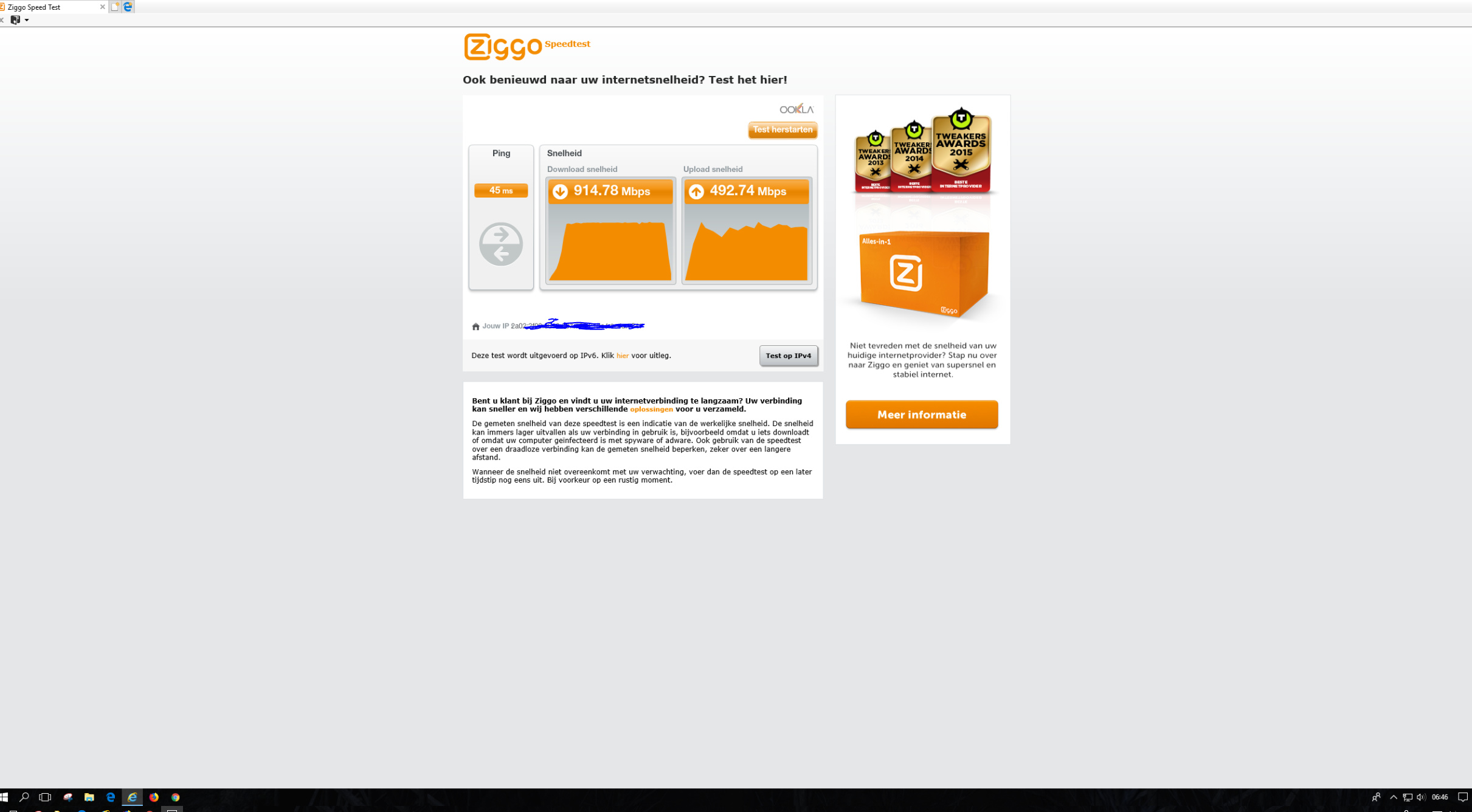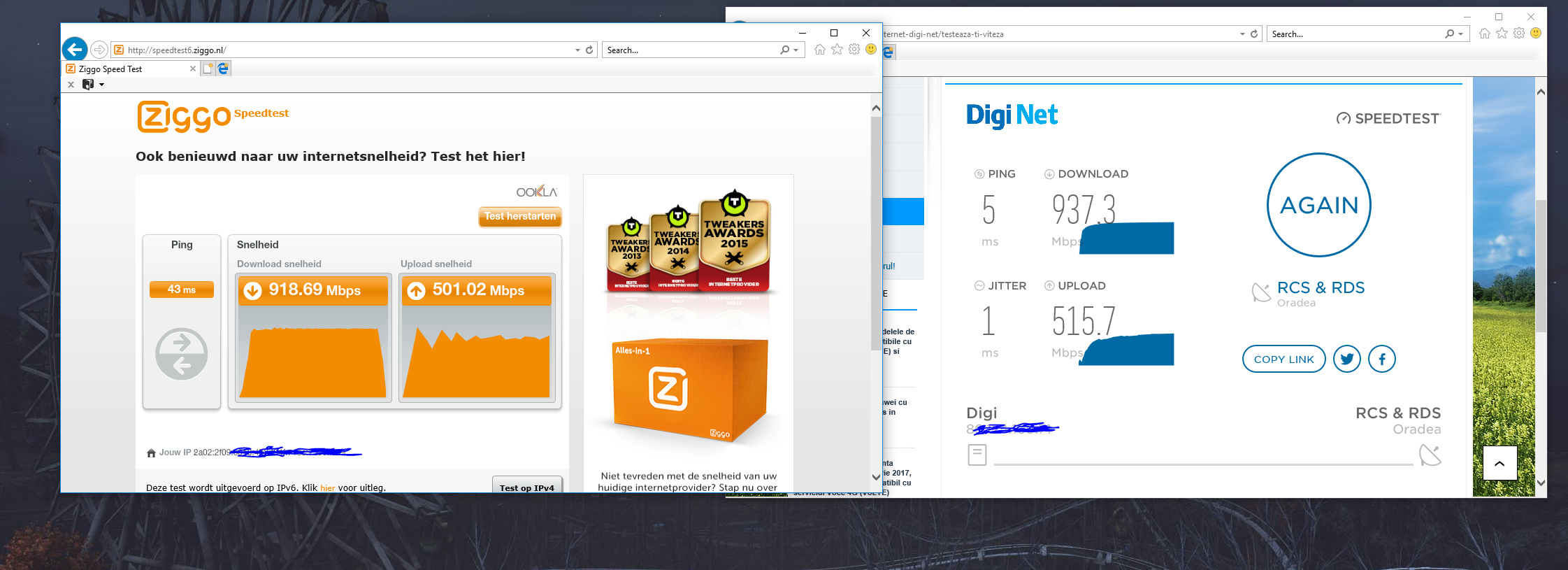Not so much because I want to replace the ACS v2 mind you but because I might want to replace some devices at my wife's lab, or at relative's houses etc in the near future.
Hello
wrt1900ACS v.2 just for the simple thing, he works well!!
PPPoE Dual Stack
https://superwrt.download/home/

Are there any hot deals for enthusiast level LEDE routers this week (black friday)? The only thing I've noticed on Amazon is the Linksys WRT AC3200 for $200 ($50 off).
Update: the (stable branch) 17.01.4 release update is working very well on both EA8500 units here - my previously stated issue with the .2 release was almost 100% a "newbie configuration error" on my part.
I've been picking up (used) WRT1900ACS v2 units on Craigslist (US) for a non-profit I'm helping out, for $50 or so.. eBay also has some good deals on the newer used AC3200 units, if you get the right auction.
Speed test 5Ghz with Huawei P10 and Samsung S4, WRT1900acs v.2 with LEDE/Superwrt!

I bought a TP-Link Archer C2600 when it cost $200+ and now it's only $90. I would definitely recommend it for such a cheap price.
I also have a Linksys WRT3200ACM. I got a refurbished one for only $95 and it runs great too.
For a pure router - Chromebox as I like x86_64 targets. Nothing to brick really and I don't need wifi as I have a separate AP system for that. Also, real Intel i3 CPU, tons of memory.
Definitely the Archer C7 AC1750 v2 for me. I can buy them second hand for 30 buck with box and 5 meter cat 5e lan cable all in as new condition and shipping included. They are branded after an local ISP and run the ISP's firmware by default but its pretty easy to flash LEDE from the webinterface, just as any normal update. I have 3 and i deploy them for everyone in my social network looking for a new router just because they are this amazingly cheap to pick up and incredibly versatile for the price. People sell them when they switch ISP and think the router can only be used with that ISP just like their modem so they sell it.
I have a general question on 'newly available devices'.
I am looking at options for a new device to replace my current one and was reading this topic. The Archer C7 AC1750 and the Netgear R7800 X4S seem to be favorite options (from reading this forum).
However, both seem to be at least two years old. Now, this in itself might not be a problem, but I am wondering why there are no 'successors' to those two favorites. Is this more or less the regular pace for routers to be 'renewed', and is there a reason to expect newer ( more capable) versions of those routers or not?
Thanks,
Alex
The Archer C7 is ar71xx based, while still a good device, ar71xx is way past its peak - and you will get into trouble with high WAN speeds (even more so in combination qith sqm).
The Netgear r7800 is based on the ipq8065 platform, which is still pretty much the top end (together with mvebu). Two krait400 derived CPU cores (ARMv7, ~cortex A15), running at 1.7 GHz, 512 MB RAM, QCA9984 802.11ac/ wave2 wlan. At the moment there isn't much headroom for 'better', unless you step over to x86.
There will be newer devices in the future (particularly ipq8074, ARMv8), but they've neither hit the FCC, nor the market so far - when they'll appear is unclear and even when they do, it will take a bit until LEDE could be ported for them, after all they actually need to get available to the developers (read, in stores), before they can even start looking into the new architecture). Even the x86 pace has slowed significantly, the router market has its own pace, driven by the needs of new wlan standards (e.g. ipq8074 <-> 802.11ax), who knows how many wlan chipsets WPA3 will drive over the cliff (if support can't be added to driver/ firmware/ hardware), faster WAN throughputs becoming commonplace (x86 has become a necessity for really fast ones) and components no longer being available.
Right now and within the forseeable future (3-6 months), the ipq8065 (Netgear r7800, ZyXEL NBG6817) or mvebu (Marvell WRT3200ACM) will remain the top end platforms for consumer routers supported by LEDE, simply due to the lead times new architectures need to become available and gain LEDE support (mt7622 might become interesting 'soon', but there aren't many devices around).
Jalapeno board by 8Devices is my favorite enthusiast device - open source so you can build your own products based upon it. It is QCA IPQ4017 based, 802.11ac Wave2
Is currently not supported by LEDE/OpenWrt.
It will be soon.
PR is waiting to be merged.
https://github.com/openwrt/openwrt/pull/713
slh, interesting points. Do you know which one of the three((Netgear r7800, ZyXEL NBG6817 or WRT3200ACM) is most stable in LEDE? I bought the r7800 but i am a little bit confused by all the development discussion and some comments about 2ms + latency with the r7800
IMHO 2ms latency is just BS....
r7800 is the best with wifi...
zyxel have dual firmware and same wifi as r7800
wrt3200acm wifi is very bad compared to stock...
so...
Currently using a Xiaomi Mi 3 Router on Padavan, however I am planning on flashing on it LEDE once I have the Xiaomi Mi 3G (first on Padavan, and then on LEDE once the Mi 3 is properly set up on LEDE), this will take time, though, due to my limited budget.
My only gripes with the Mi 3 and 3G, is the fact that they only have 2 Ethernet ports, rather than at least 4, and that I have to use an power adapter, since their power bricks have the US "prongs", rather than the EU "poles".
Combine that with the Netgear DM200 as a modem (I wish that it would support G.INP and vectoring, however I am hopeful that support could be added on LEDE), and barring the 100Mbts Ethernet and 100Mbts VDSL2 ports, you have a killer combination for half the price of compararable solutions.
I still need to unbrick my DM200 though, after making a noob mistake, and unplugging it while waiting for it to reboot.
it's a shame that a vdsl2 modem have 100mb ethernet port...
Well, this really depends on which speeds the ISP wants to offer, up to around 100Mbps gross rate VDSL2 (with the typical trimmings, like PPPoE and one VLAN tag) and FastEthernet deliver around the same goodput to the enduser. Only above 100 Mbps fast ethernet becomes a noticeable bottleneck.
That said, it still is sad that today not all devices have >= 1Gbps ethernet....
If you already have the r7800, you don't need to buy the nbg6817 anymore - both devices are very, very similar. One offers an eSATA port, the other 4 GB eMMC (2*(4+64) MB usable) and dual-boot. Right now the nbg6817 has functional wlan LEDs (just amber, instead of the original white colour), while the r7800 can't light them up yet (but that's about to change soon'ishly, for both), that's probably the only difference.
I'm pretty happy with my nbg6817, but I can't compare it to mvebu (wrt1200ac/ wrt3200acm) or mt7621 (xiaomi mi 3g), as I've never had opportunity to test either.
Very personal interpretation follows:
- My decision favoured the nbg6817 over the r7800 because of dualboot, the larger flash and because the bootloader is on a separate (4 MB spi-nor) flash that never gets touched, making it rather failsafe (it also offers recovering via tftp, just like the r7800); eSATA would have been nice, but given that I have no intention to actually connect a HDD to my router, that wasn't a decisive factor for me.
- The wrt3200acm's price just was a bit over the top for me, the wrt1200ac would have been more within my price range - but concerns over wlan stability pushed the decision towards ipq8065/ QCA9984 instead.
- mt7621 has always been tempting (especially considering its price), but -except for the D-Link DIR-860L B1 (older mt7602 wlan for 2.4 GHz)- they aren't available from europe (and I don't want to go through the hassle with customs). While its routing performance is very good (similar to mvebu), CPU power is on the weak side and mips wasn't really on my preferred arch list anymore (mt7621 seems to be last of its breed). In terms of mt7602/ mt7603 2.4 GHz wlan reliability, especially in noisy environments, it is said to be still rather challenged (and I do still require 2.4 GHz for most of my devices and to retain good indoor range).
- ipq4018/ ipq4019 could have been another lower cost solution, but when I bought mine in april 2017, availability and LEDE support were still a bit difficult - and I would have liked a bit more flash/ RAM (and external antennas; GL.iNet GL-B1300 and OpenMesh A42 are very new and don't offer external antennas either).
- mt7622 isn't quite supported yet (but supposed to arrive with kernel 4.14), my main concern with the existing devices (besides actually purchasing them) is the wlan situation. While it is basically the same as mt7621, at least the existing devices only expose a rather weak one-antenna 2.4 GHz wlan and just one mini-PCIe slot usable for a 5 GHz wlan card - so not really nice in terms of attaching two good wlan cards (I do still need good 2.4 GHz wlan as well); ARMv8 would have been nice though.
While I'd very much like to test mvebu and mt7621 (mips)/ mt7622 (ARMv8), given the opportunity I'd still buy another nbg6817 to gain an option to tinker with it a bit more (mine acts as my main router, providing vlans for landline (SIP) and other essential services, so I can't 'break it' all the time). Ping times aren't a priority for me (within reason), but they're stable and uniform (0.6 ms variation) for me, without any spikes. If I had (the prospect of) WAN connections significantly faster than ~300 MBit/s, mvebu (or x86) would have been a better choice, but for my needs, I have plenty of headroom for the next 5-8 years (CPU, flash and RAM shouldn't become a bottleneck anytime soon, which was a priority for me).
For ipq8065 (just like mt7621 and mvebu), I strongly recommend snapshots over 17.01.x, as there have been significant improvements over the last ~year. But with the next release, stable should be fine for most users (I'll continue to stick to the master branch though).